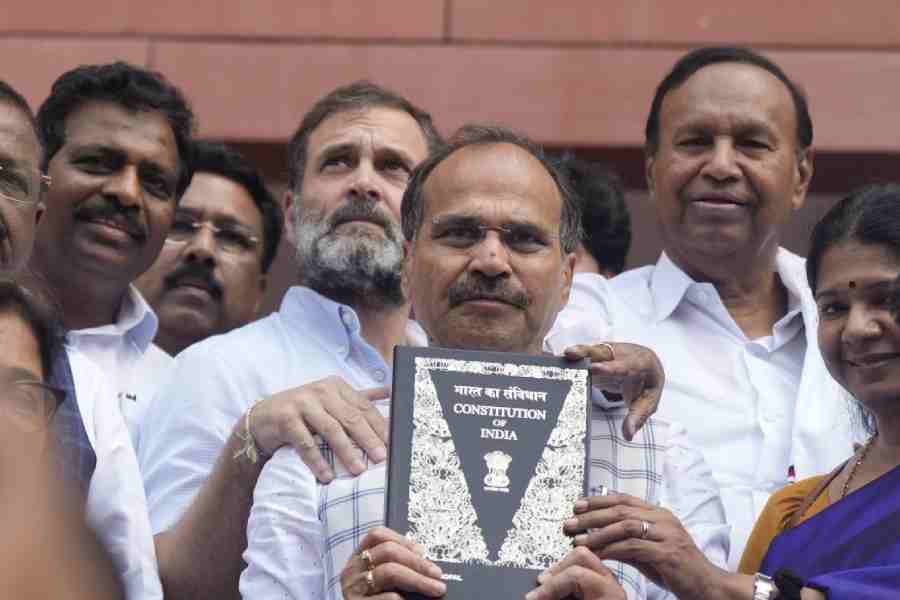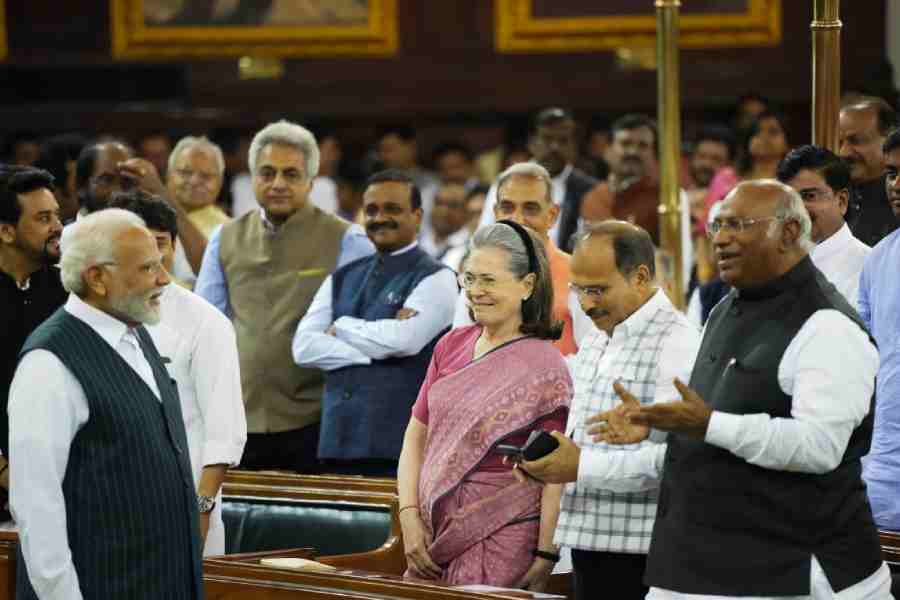Minutes before entering the new Parliament building on Tuesday when Prime Minister Narendra Modi spoke of India’s aspirations soaring to a high never witnessed in a thousand years, the Congress drew his attention to the fundamental concerns about constitutional rule, reading out the Preamble to the Constitution that guarantees justice, liberty, equality and fraternity.
The precious words that form the soul of the Constitution reverberated in the new Parliament building on the first day of its existence, defining the political context in which the transition from the old building happened. The main Opposition party wanted to remind the government that the transition was merely locational as the governance doctrine had to be confined within the framework of the Constitution.
Reading out the Preamble just after the shift to the new Lok Sabha, Congress leader Adhir Chowdhury said: “Parliament is a national asset, belonging to every citizen, not to any party or a leader.”
He warned against any attempt to create an artificial divide between India and Bharat, arguing that “Hindi-tva” should not be imposed upon the nation like “Hindu-tva”.
The Congress leader was speaking just after the Prime Minister, who chose to focus on “discipline” and “cooperation” in the new Parliament instead of delving into the core principles of democracy. Modi had said: “Bhavan badla hai, bhavna bhi badalni chahiye (The House has changed, even attitudes should change).” He insisted that the conduct over the next few months would decide who would win the 2024 elections.

Congress MP Adhir Ranjan Chowdhury, holding the Constitution of India, with party MP Rahul Gandhi and other Parliamentarians walks towards the new Parliament building, in New Delhi, Tuesday, Sept. 19, 2023 PTI photo
Hoping that the MPs would follow the Speaker’s instructions, Modi said the “Lakshman rekha” of parliamentary dignity must not be crossed. He sought forgiveness from anybody whom he might have hurt by mistake and asked the MPs to set a high example with their speech and conduct. Minutes before entering the new building, he exhorted everybody at a function in the old Parliament’s Central Hall to contribute to India’s phenomenal rise when aspirations soared like never before in the last 1,000 years.
Even at that programme, Adhir contended that the illustrious legacy of Parliament had nothing to do with architectural splendour. Drawing the government’s attention to the challenges the nation was grappling with, he sought the focus on immediate solutions. He referred to India’s miserable position in the global human development index, rising economic disparity, unemployment, high prices of essential commodities and the need for social harmony.
Speaking at the same event, possibly the last in the old building which has now been renamed Samvidhan Sabha, Congress president Mallikarjun Kharge said: “I wish to emphasise at this juncture that this is all due to the collective and dedicated effort by parliamentarians cutting across party lines over the past seven-and-a-half decades. This rich legacy has formed a strong foundation for India’s growth as a powerful democratic nation.”
Kharge added: “The success of the institutions lies in upholding constitutional values and ideals. The idea that institutions are sacrosanct and essential for success is a fundamental principle in governance and development. We should commit ourselves to adhering to and preserving the constitutional values and parliamentary traditions as the country moves ahead in effectively performing parliamentary duties and in our endeavours for the growth of our nation.”
Kharge’s charge
At the Rajya Sabha in the new building, Kharge accused the government in the presence of Modi of weakening the federal structure.
“You (Modi) spoke about strengthening federalism. Everybody says federalism is being weakened day by day under your leadership. You brought down governments in Maharashtra, Karnataka.... You demolished democratically elected governments. Your government is not releasing to the states their share of GST and centrally sponsored schemes like the MGNREGA. Is it strengthening federalism?” Kharge said.
Speaking earlier, Modi had said the Rajya Sabha represents the states.
“Through cooperative federalism, we have progressed. We have got rid of Covid with the help of the states. Around 220 G20 meetings were held across the states. The diversity of the states is represented in the artworks used in this building,” Modi said.
Education minister Dharmendra Pradhan and finance minister Nirmala Sitharaman objected to Kharge’s comments. Sitharaman said the government had released GST dues to states on time. Rajya Sabha Chairman Jagdeep Dhankhar asked both Kharge and Sitharaman to table documents to substantiate their claims.
Kharge’s statement came against the backdrop of the central government withholding the release of funds to Bengal under the MGNREGA since December 2021.
Kharge questioned Modi’s silence on the Manipur violence. “The Prime Minister is giving speeches for two to three hours every day. But he will not speak on Manipur,” the Congress chief said.
Kharge pointed out that the UPA government had in 2010 brought a bill to reserve 33 per cent seats for women in Parliament and the Assemblies.
In his speech, Modi had spoken about the constitutional amendment bill his government introduced in the Lok Sabha to reserve one-third of the seats for women in Parliament and the assemblies. He called it a big step towards the empowerment of women.
Additional reporting by Basant Kumar Mohanty










